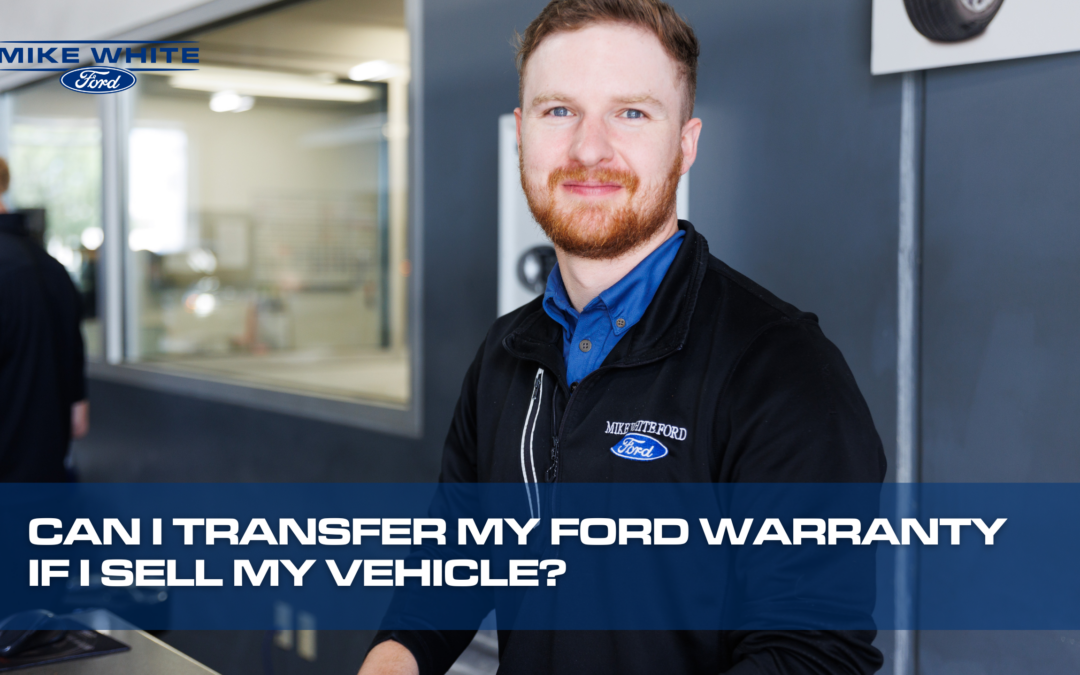The new vehicles we sell at Mike White Ford come with standard Ford warranties, and many of our customers also opt to buy extended warranties at the time of purchase. If you plan to own and drive your vehicle for many years, an extended warranty that lasts beyond the standard warranty can be very valuable.
Warranties provide peace of mind during your ownership, reassuring you that if your car suffers any mechanical or technical problems, repair or replacement will be covered without you being out of pocket. But now and then, people decide to sell their cars before the vehicle’s warranty term has ended. In these cases, many wonder: if I sell my car, will the warranty cover the vehicle under the new owner? The question often arises because the seller may want to know if the value of the warranty will enable them to ask for a higher price or make the vehicle more attractive to potential buyers.
The short answer to the question is: Yes! However, there are a few wrinkles you should be aware of.
Understanding Ford Warranties
Ford Motor Company offers several vehicle warranties to protect against unexpected repairs for parts designed to last. The most common warranties include:
- Bumper-to-Bumper Warranty: Covers repairs and replacements on nearly all vehicle parts, excluding wear-and-tear items like brake pads and tires. Typically, it lasts 3 years or 36,000 miles, whichever comes first.
- Powertrain Warranty: Covers all engine, transmission, and drivetrain components and usually extends to 5 years or 60,000 miles.
- Corrosion Warranty: Covers rust damage to sheet metal parts. This warranty generally lasts for 5 years with no mileage limit.
- Safety Restraint System Warranty: Covers repairs on safety restraint systems, including seat belts and airbags, for 5 years or 60,000 miles.
- Emissions Warranty: Covers specific emission control parts for 2 years or 24,000 miles, with some components covered for up to 8 years or 80,000 miles.
Transferring Your Warranty
The good news for both sellers and buyers is that Ford warranties are typically transferable. Here are the key steps and considerations:
- Verify Eligibility: Not all warranties are automatically transferable. For example, extended service plans or aftermarket warranties might have different rules. Check the specific terms of your warranty to determine whether it is transferable.
- Gather Documentation: Put together all necessary documents, including the original purchase paperwork, maintenance records, and warranty booklets. These documents prove the warranty’s validity and can facilitate a smooth transfer.
- Notify Ford: Contact Ford Motor Company or your local Ford dealership to inform them of the sale and the warranty transfer. They may require specific forms to be filled out and submitted.
- Transfer Fee: In some cases, there might be a small transfer fee. Confirm this with Ford or your dealership.
Benefits of Transferring Your Warranty
For Sellers:
- Increased Vehicle Value: A transferable warranty can make your vehicle more attractive to potential buyers, providing them with added security and savings on future repairs. This means you can also ask for a higher price for the car.
- Faster Sale: Highlighting the transferable warranty in your listing can help your vehicle stand out, potentially leading to a quicker sale.
For Buyers:
- Peace of Mind: Knowing that the vehicle is still under warranty provides reassurance that major repairs will be covered if something goes wrong. If it is an extended warranty, the prior owner was willing to pay more to keep the car in good running condition and likely adhered to a regular maintenance schedule so as not to void the warranty. This provides further reassurance, removing some risk of buying a used vehicle.
- Cost Savings: A warranty may save the new owner from significant repair costs, making the purchase more financially appealing.
Special Considerations
While the standard new vehicle warranties are usually transferable, certain conditions might apply. For example, if you’ve purchased an extended service plan with an independent warranty company, you must check transfer policies with the provider. Also, different rules might apply if the vehicle was used for commercial purposes. It’s also important to remember that warranties do not cover damage or issues caused by neglect or improper use.
Transferring your warranty when selling your Ford vehicle can significantly enhance its appeal and value. Both sellers and purchasers can benefit from the peace of mind and financial security that warranties provide. Always refer to the official Ford documentation or consult your local Ford dealer for the most accurate and specific information. Here in North Idaho, that would be us: Mike White Ford. Our staff can help you decipher the terms of your warranty or answer your questions.
Remember, too, that if you are ready for a new ride, you can also trade in your older vehicle at our dealership, which has showrooms in Coeur d’Alene and Sandpoint. Our team is ready to help you find the perfect car. Visit us today and drive away with confidence!

